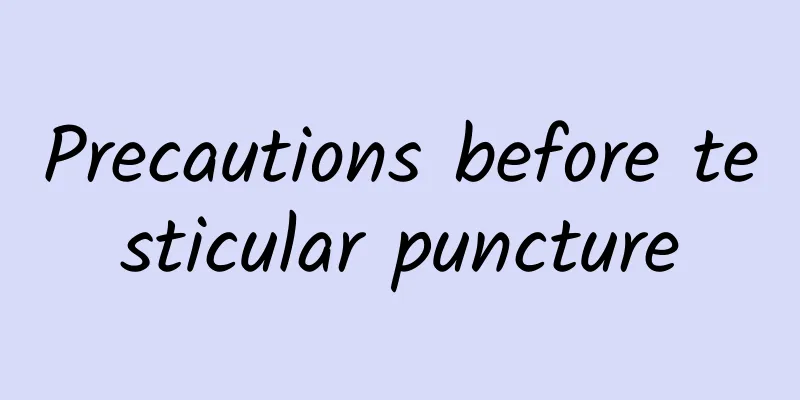Precautions before testicular puncture

|
Testicular puncture biopsy is a method of examining men's diseases. This test can be performed on men with azoospermia or ejaculatory dysfunction. The skin must be strictly cleaned and disinfected before testicular puncture. It is best to take a full shower the night before the test and wear clean and loose clothes. Local anesthesia is required before testicular puncture, and then a syringe is used to directly puncture the skin into the epididymis to collect epididymal fluid. Testicular puncture can also be performed by cutting the epididymis to find sperm through a minor microsurgical operation. If active sperm is found, the diagnosis is established, and the sperm extracted can be used for intracytoplasmic sperm injection to obtain legitimate children. If no sperm is found in the epididymal puncture or the epididymis has been damaged (such as tuberculosis or trauma), or there is a suspected sperm production disorder, that is, non-obstructive azoospermia (such patients may have sperm production in a certain part of the testicle), a testicular biopsy or testicular sperm extraction can be performed, that is, sperm is directly obtained from the testicle through aspiration or a minor surgical operation, and then IVF treatment is performed. Testicular puncture is a one-time extraction of testicular tissue to check whether the testicles have spermatogenic function. Do not exercise vigorously or have sex within one week after the puncture. Use the puncture needle and syringe, after routine skin disinfection and anesthesia, puncture the puncture needle through the scrotal skin into the testicle, pull out the needle core, aspirate the syringe to obtain a little testicular tissue, then pull out the puncture needle, bandage the puncture site, and send the testicular tissue for examination. Sometimes, multiple or bilateral epididymal testicular puncture biopsies may be required to find sperm or sperm with better motility in the epididymal or testicular puncture biopsy tissue. After the testicular puncture examination, you need to rest properly and avoid eating spicy foods such as chili peppers. If the testicular puncture examination is performed through minimally invasive surgery, you must pay attention to keeping the testicular area clean and hygienic after the operation. Do not let the wound area be contaminated by water or other stains. Remember to change your underwear every day. Do not clean the testicular area within one week after the minimally invasive surgery. |
<<: What causes testicular bleeding?
>>: What causes itchy testicles?
Recommend
Why is the left testicle bigger than the right?
What is the reason for the left testicle to be la...
Where is the best place to treat premature ejaculation?
At present, the social development is continuing ...
What causes testicles to become soft?
Under normal circumstances, the testicles are not...
One-week diet for men to lose fat and gain muscle
How to increase muscle and reduce fat through fit...
What causes cold limbs in men?
We all know that the structure of the human body ...
What to do if middle-aged men have gout caused by high uric acid
High uric acid levels in the body are closely rel...
What causes age spots on the glans?
Age spots are a type of skin disease that easily ...
Scrotal melanin spots pictures
There are gray-black spots on the scrotum. I beli...
Can a man still ejaculate after a vasectomy?
If a man does not want to have children, he will ...
Causes of red and itchy foreskin
I believe everyone knows the importance of foresk...
Is the gender of a baby related to physical strength?
The mystery of giving birth to a boy or girl has ...
Gynecomastia pictures
Gynecomastia (GYN) is a clinical medical symptom ...
What is the reason for male penis erection?
What causes the penis to not get erect? This is w...
Can the glans penis be disinfected with iodine?
Having glansitis is very painful, because glansit...
How to treat scrotal warts
Scrotal viral warts are a very common disease. Th...









